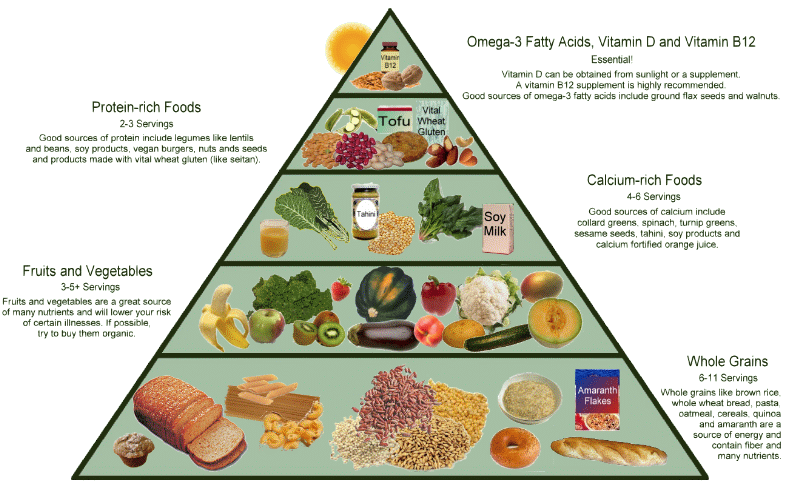A healthy diet encompasses, in its standard concept, the adequate consumption of quality, microbiologically safe foods, in the right quantity. To translate this concept, we have some tools, such as, for example, the Food Pyramid for the Brazilian Population, a visual instrument on what we should and how much we should consume daily.
The focus of this post is not on the conventional food pyramid, however, it should be noted that in essence, it recommends a daily diet that encompasses all the foods available in the plant and animal world in appropriate portions, according to each food.
Starting from the point that the pyramid encompasses foods from the plant and animal world, and that it is synonymous with good nutrition, a big question arises: and whoever is vegetarian, or is thinking about becoming vegetarian, does not have or will have a healthy diet?
This is a big question among most people who are unaware of this diet (or lifestyle), as well as the most common question among many people who want to become vegetarian.
Before any consideration, we must conceptualize what vegetarianism is. The vegetarian diet excludes meat and its derivatives, but you can consume milk, dairy products and eggs. They are classified as: ovolactovegetarian (OLVEG), as it includes eggs, milk and dairy products; lactovegetarian (LVEG), which includes milk and its derivatives; and restricted vegetarian (VEGE or VEGAN), which does not include any product of animal origin. There is also the Raw vegetarian diet, which consists only of raw plant-based foods, and the Frugívera diet, which consists only of fruits.
The motivation for a vegetarian diet can be religious, philosophical, a form of protest against the killing of animals, simply a matter of taste or health. In some countries the motivation is economic. There are people who feel more willing when they exclude certain items from their diet, and among these items, meat can be part of it. Motivations can be any of these, as well as something personal. Regardless of the reasons, the fact is that the vegetarian population is growing more and more, and, therefore, information about its benefits and possible harms must be widely disseminated.
There are currently several studies that confirm that it is perfectly possible to obtain almost all nutrients from a rich, diverse and balanced diet of plant origin. Foods of animal origin are rich in iron and zinc, that is, theoretically, removing these items from the diet would lead to a deficiency, but studies show that a correct combination of foods of plant origin can provide these micronutrients, as well as proteins. , in the appropriate proportion.
Regarding vitamin B12, plants do not synthesize or store it, the source of this vitamin is microbial synthesis. Vitamin B12 only exists in vegetables if they are contaminated by bacteria that produce it. Animals either ingest the vitamin or absorb what is produced by bacteria in their intestines, subsequently becoming possible sources of vitamin B12. There is little documentation of vitamin B12 deficiency among vegetarians due to the small requirements for this vitamin, relatively adequate storage and a very efficient enterohepatic circulation that recovers much of the vitamin B12 excreted in the bile. However, it is important to supplement this vitamin, as well as, for those who have low sun exposure, also supplement vitamin D.
In general, ovolactovegetarian, lactovegetarian and vegetarian diets are capable of providing all the nutrients, as well as a balanced non-vegetarian diet. Furthermore, as it contains lower amounts of saturated fat and cholesterol, in addition to other lifestyle patterns generally associated with followers of these diets, such as physical activity, low alcohol consumption, and cessation of the smoking habit. A great benefit of these diets is the reduction in the risk of chronic non-communicable diseases (Systemic Arterial Hypertension, Diabetes Mellitus, etc.) and cardiovascular diseases (Atherosclerosis, Stroke, etc.).
It should be noted that there are currently several publications, guides and even a food pyramid adapted for the vegetarian population. Seeking to study the subject and nutritional guidance from a professional nutritionist, for the adequacy and correct combination of foods, as well as for guidance in special phases of life, such as growth phases (children and adolescents) and pregnancy, is extremely important for those who follow this diet and for those who wish to follow it.
Correct information is the key to a healthy life!
Sources:
http://afonsovfx.wordpress.com/category/saude/page/2/
http://www.nutricaoemfoco.com.br/NetManager/documentos/dietas_vegetarianas.pdf
http://www.scielo.br/scielo.php?script=sci_arttext&pid=S0066-782X2007001600005
http://www.scielo.br/scielo.php?script=sci_arttext&pid=S1807-59322010001000022

